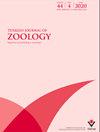小麦抗性和生物合理杀虫剂对樱桃燕麦蚜的毒性影响(半翅目:蚜科)
IF 1.3
4区 生物学
Q2 ZOOLOGY
引用次数: 0
摘要
:蚜虫对小麦作物造成严重损害。为了确定寄主植物的抗性和杀虫剂是如何管理Rhopalosiphum padi L.的。本实验旨在了解寄主植物抗性和生物合理杀虫剂对小麦(Triticum aestivum L.)作物蚜虫的影响。在两个生长年份(2017/18和2018/19)进行了田间试验,以了解小麦对蚜虫的抗性。小麦的田间抗性在Pirsabak-08品种中高度表达(侵扰范围=1-2.5),而最易感的品种是Faisalabad-08(侵扰范围>10)。品种偏好试验结果表明,Pirsabak-08吸引了5.33只蚜虫,Faisalabad-08是最易感的品种,72小时后发现25.0只蚜虫。线性相关分析表明,蚜虫吸引力与毛状体密度呈负相关。将阶段特异性昆虫生长调节剂(IGR)和天然杀虫剂应用于相对更具抗性的品种。pyropoxyfen和印楝的效果最好,种群数量迅速下降,分别降至2.66和2.60只/株。目前的研究结果表明,利用对蚜虫具有抗性的寄主,同时使用更安全的杀虫剂,可以显著减少小麦的危害。本文章由计算机程序翻译,如有差异,请以英文原文为准。
The impact of wheat resistance and bio-rational insecticides toxicity against cherry-oat aphid, Rhopalosiphum padi L. (Hemiptera: Aphididae)
: Aphids cause substantial damage to the wheat crop. In order to determine how host plant resistance and insecticides manage the Rhopalosiphum padi L. Current experiments were carried out to find the influence of host plant resistance and bio-rational insecticides against aphids in wheat ( Triticum aestivum L.) crop. Field experiments were carried out for two growing years (2017/18 and 2018/19) to access the resistance of wheat against the aphids. The field resistance of wheat is highly expressed in Pirsabak-08 variety (infestation range = 1–2.5) while the most susceptible variety is Faisalabad-08 (infestation range > 10). The varietal preference experiment results revealed that 5.33 aphids were attracted towards Pirsabak-08 while Faisalabad-08 stood as the most susceptible variety as 25.0 aphids were found after 72 h. The linear correlation analysis revealed that the aphid attractiveness is negatively correlated to the trichome density. A stage-specific insect growth regulator (IGR) and natural insecticides were applied to a comparatively more resistant variety. The best results were achieved with pyriproxyfen and neem, as the population rapidly declined to 2.66 and 2.60 aphids/plant, respectively. Current findings lead to the conclusion that utilizing resistant hosts against aphids along with the use of safer insecticides can significantly reduce wheat damage.
求助全文
通过发布文献求助,成功后即可免费获取论文全文。
去求助
来源期刊

Turkish Journal of Zoology
ZOOLOGY-
CiteScore
2.30
自引率
10.00%
发文量
24
审稿时长
6-12 weeks
期刊介绍:
The Turkish Journal of Zoology is published electronically 6 times a year by the Scientific and Technological Research Council of Turkey (TÜBİTAK).
-Accepts English-language manuscripts in various fields of zoology including systematics, developmental biology, behaviour biology, animal models, molecular biology and molecular phylogeny, genomics, physiology (cell communication and signaling systems), biochemistry and immunohistochemistry, applied parasitology and pathology, nanobiotechnology, ecology, evolution, and paleontology of animal taxa.
-Contribution is open to researchers of all nationalities.
-Short communications are also welcome, such as reports of a preliminary nature or those including new records from specific localities or regions, and the editor reserves the right to decide that a paper be treated as a short communication.
-The papers that deal with purely checklists, new host and non-regional new locality records will not be consider for publication.
-Letters to the editor reflect the opinions of other researchers on the articles published in the journal. The editor may also invite review articles concerning recent developments in particular areas of interest.
 求助内容:
求助内容: 应助结果提醒方式:
应助结果提醒方式:


